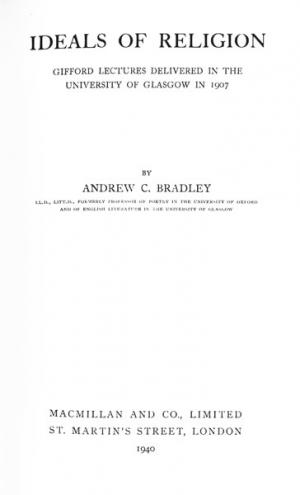In the Introduction, A. C. Bradley states that ‘Religion is not a mere state of activity of the intellect; it is worship—inward if not also outward’ (p. 1). From here, Lecture I, ‘The Ideal of the Spirit’, outlines a functional notion of religion as a phenomenon that takes as its primary characteristic the common and most widely accepted usage of that word, ‘religion’. Bradley explains that his inquiry is into ‘the common nature of all forms of religion’ and into ‘the origin and growth and religion’ (pp. 8–9), acknowledging the limitation of his own project insofar as religion is only truly known in its enactment. He begins by considering the inner and individual nature of religion and moves toward its forms of outward, communal expression. Inward religion concerns the relationship between God, self and world and aims at union with the object of worship (God) via belief in that object and in the religion’s ability to affect such union. Bradley clarifies that religion does not consist in solely belief about God but demands a degree of devotion of the will to God. The second lecture, ‘The Ideal of the Mind’, examines the progress of religions and their development from ‘lower’ forms to ‘higher’, focussing now on the outward expression of religion rather than the inward. Bradley observes that religions tend to move toward monotheism, universalism (as distinct from a provincial view of God as the god only of a certain group) and infinity; that is, God as peerless, un-preferential and limitless. This progress is, to Bradley, one toward peace and unity. Religions also tend to progress from sense/nature to spirit/spirituality. The purpose of worship is union with that being which is free from every limitation applicable to the worshipper, who hopes to share in such liberation. Progress occurs in religion by the negation of older modes of being. Bradley addresses some of the objections to the idea of religion in Lecture III, ‘The Inadequacy of Natural Religion’, asserting that one preferable idea of religion consists in self-devotion as its own end, as opposed to devotion of the self to a particular, non-phenomenal object. The object of worship, when it can be objectified, is inadequate and inevitably leads to idolatry. Another pitfall of natural religion is a prioritization of morality, which too can become idolatrous. In Lecture IV, ‘The Religion of Ideal Humanity’, Bradley demonstrates that a religion holding an ideal view of humanity (as perfectible) and which involves no cosmological belief about God, the universe, etc., cannot function fully as religion because its object lacks the power necessary to sustain religious devotion. Bradley discusses the conceptions of religion in Seeley’s 1882 book Natural Religion and the theism advocated by John Stuart Mill in Lecture V, ‘The Ideals of Seeley and Mill’. In Lecture VI, ‘Abstract and Concrete Idealism’, it becomes clear that religion seeks to bring about concrete and not abstract ends; it desires the realisation of its ideal. Paradoxically, however, religion strives to view that which it desires as both ‘to come’ and having ‘already come’; there are always two points of view, that of eternity/infinitude and that of temporality/finitude.
In Lectures VII and VIII, ‘Religious Ideas and Truth (I) and (II)’, Bradley begins by exploring how one arrives at a concept of religious truth, whether to base truth on intellectual theory versus personal experience; the latter, it seems, always wins out over the former. The intellect does, of course, play a role, insofar as it accounts for and confirms religious experience and does not seek to explain it away. The second lecture on this subject shifts focus away from the natural to the imaginative, likening religion more to poetry than to science. Bradley observes that religion collides with science and philosophy when it comes to natural events and processes, and even with theology and metaphysics, because the religious (like the poetic) imagination thrives more on ambiguity than certitude. Religion need not necessarily take the ideas it uses to be perfectly true or adequate, and it is best for religion to be self-aware of this. Lecture IX, ‘Truth and Reality’, argues that all finite existence, which cannot be overcome, partially manifests the infinite in varying degrees and values, which is reflective of the differences between forms of finite existence. In short, all ideas of truth, reality and the like are partial, inconsistent and inadequate, consistently pointing to some infinite beyond that which we experience in the finite realm. Bradley posits in Lecture X, ‘Man as Finite Infinite’, that an essential contradiction exists in man’s nature which religion brings to light most fully and seeks to overcome: namely, humankind, being finite, is, like all other finite matter, inconsistent, because it participates in and/or expresses the infinite but does so imperfectly. Further, man is such a walking contradiction because he consists of finite body and infinite spirit at one and the same time. The final lecture, ‘Good and Evil’, seeks to apply and connect this discussion of religion with the problem of good and evil. Bradley concludes that religion arises, and is indeed necessary, because of the existence of evil, which itself is the result of our imperfection, the insurmountable contradiction between our finite being and our infinite longings. Religion would be needless if evil were erased, and this is precisely the task of religion: to provide an escape from evil. Religious faith seeks to view evil as otherwise than evil, which is to conform the moral vision with the will of God, who, being infinite, cannot know evil as evil (evil can only exist in nature/finitude). So, the end of religion as conforming to the will to God, and the end of religion as the overcoming of or release from evil, are, in the end, synonymous.



